NURS101 Report: Ethical and Legal Issues in Healthcare Case Study
VerifiedAdded on 2022/10/12
|9
|2110
|282
Report
AI Summary
This report delves into the ethico-legal complexities inherent in healthcare, focusing on a case study involving a medication error with a 7-month-old patient. It examines key ethical principles like autonomy, justice, beneficence, and non-maleficence, highlighting their violation in the scenario. The report analyzes the legal ramifications of the error, including the failure to inform the parents and the potential consequences for the nurse involved. It emphasizes the development of ethical awareness within a healthcare setting, including the importance of leadership in fostering an ethical environment and the role of policies and procedures in preventing future errors. Furthermore, the report applies Driscoll's model of reflection to analyze the impact of the incident and to explore how the author's understanding of nursing practices and ethics was enhanced by the events and the implementation of new hospital policies. Relevant literature and resources are integrated to support the analysis and demonstrate a comprehensive understanding of the ethical and legal dimensions of the case study.
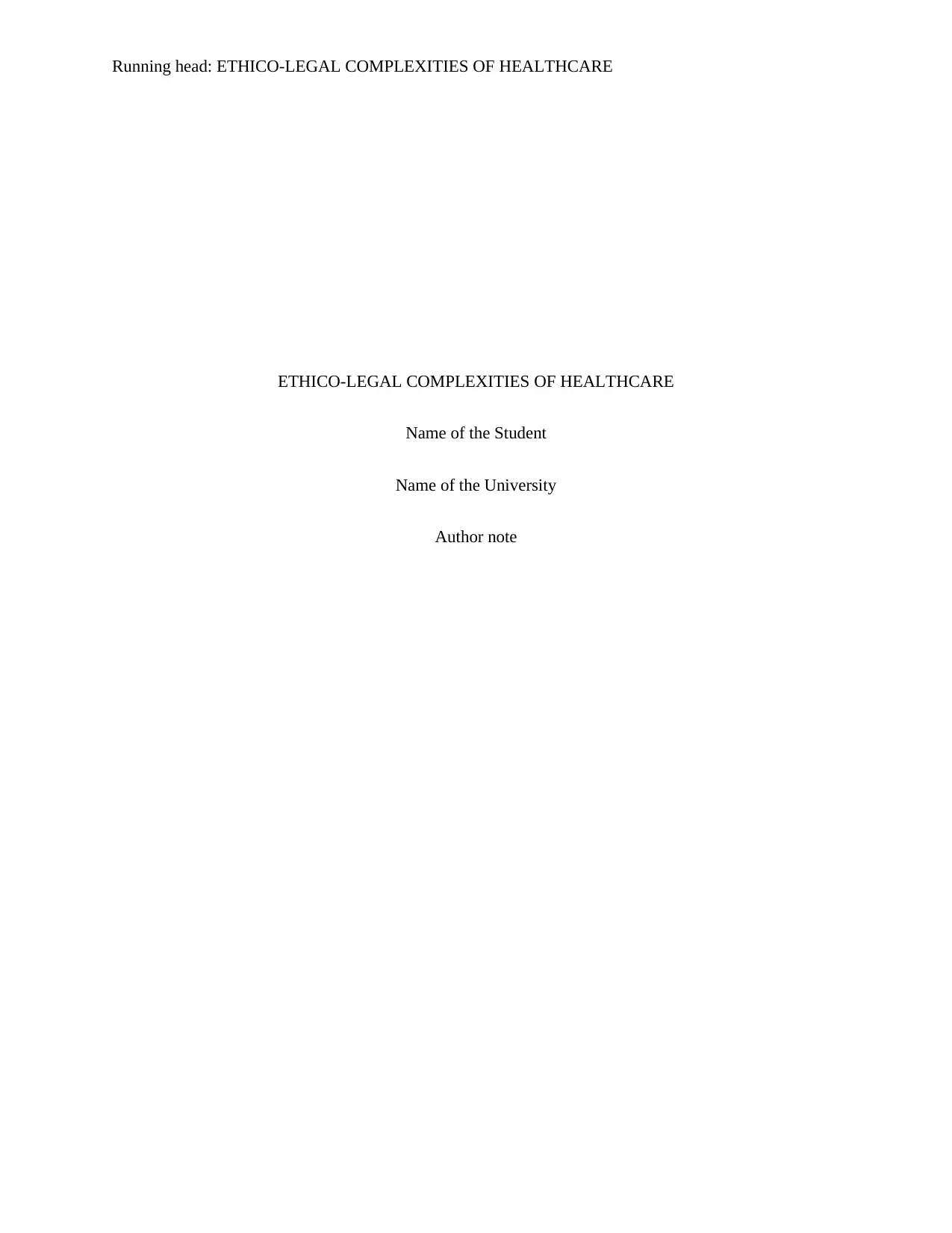
Running head: ETHICO-LEGAL COMPLEXITIES OF HEALTHCARE
ETHICO-LEGAL COMPLEXITIES OF HEALTHCARE
Name of the Student
Name of the University
Author note
ETHICO-LEGAL COMPLEXITIES OF HEALTHCARE
Name of the Student
Name of the University
Author note
Paraphrase This Document
Need a fresh take? Get an instant paraphrase of this document with our AI Paraphraser
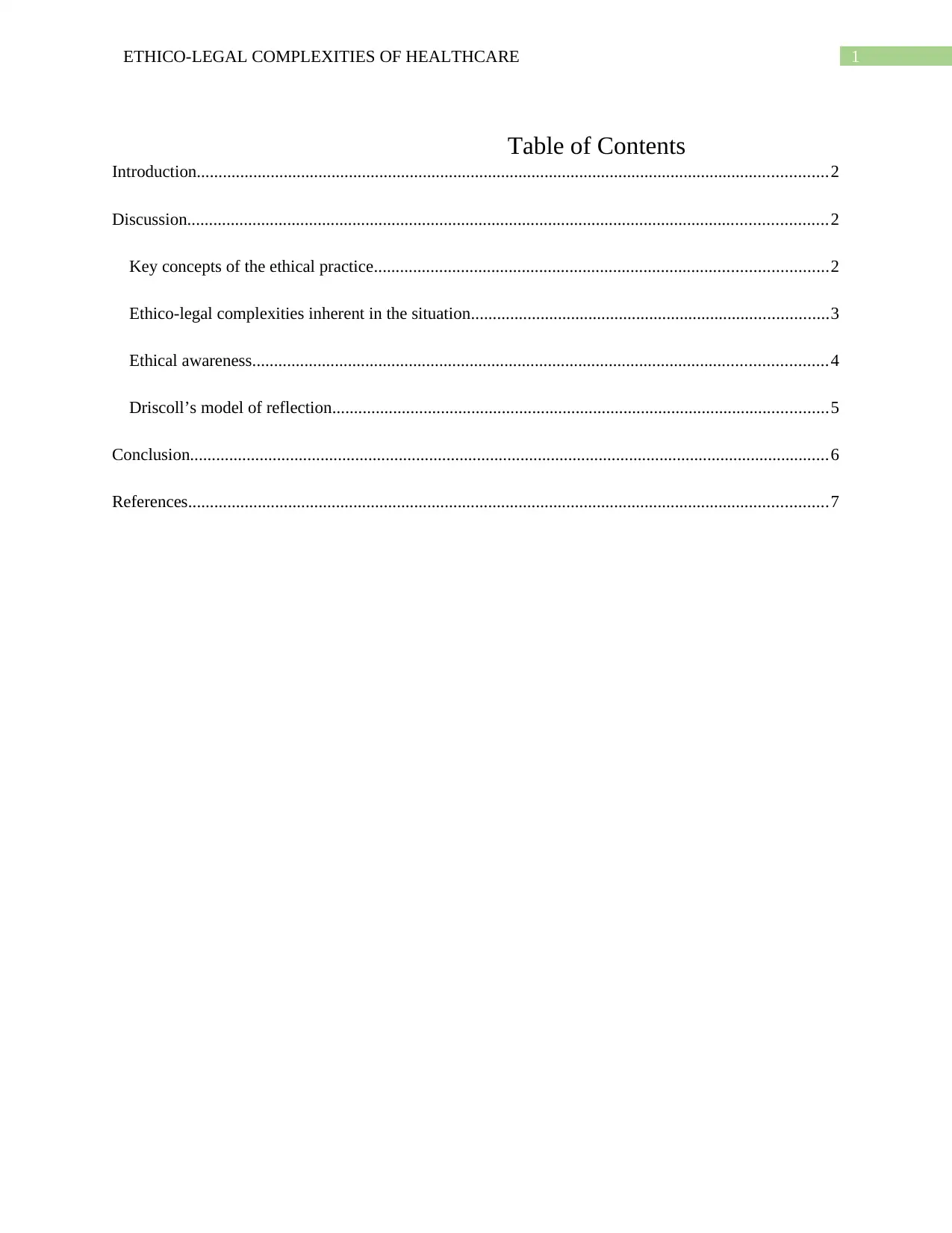
1ETHICO-LEGAL COMPLEXITIES OF HEALTHCARE
Table of Contents
Introduction.................................................................................................................................................2
Discussion...................................................................................................................................................2
Key concepts of the ethical practice........................................................................................................2
Ethico-legal complexities inherent in the situation..................................................................................3
Ethical awareness....................................................................................................................................4
Driscoll’s model of reflection..................................................................................................................5
Conclusion...................................................................................................................................................6
References...................................................................................................................................................7
Table of Contents
Introduction.................................................................................................................................................2
Discussion...................................................................................................................................................2
Key concepts of the ethical practice........................................................................................................2
Ethico-legal complexities inherent in the situation..................................................................................3
Ethical awareness....................................................................................................................................4
Driscoll’s model of reflection..................................................................................................................5
Conclusion...................................................................................................................................................6
References...................................................................................................................................................7
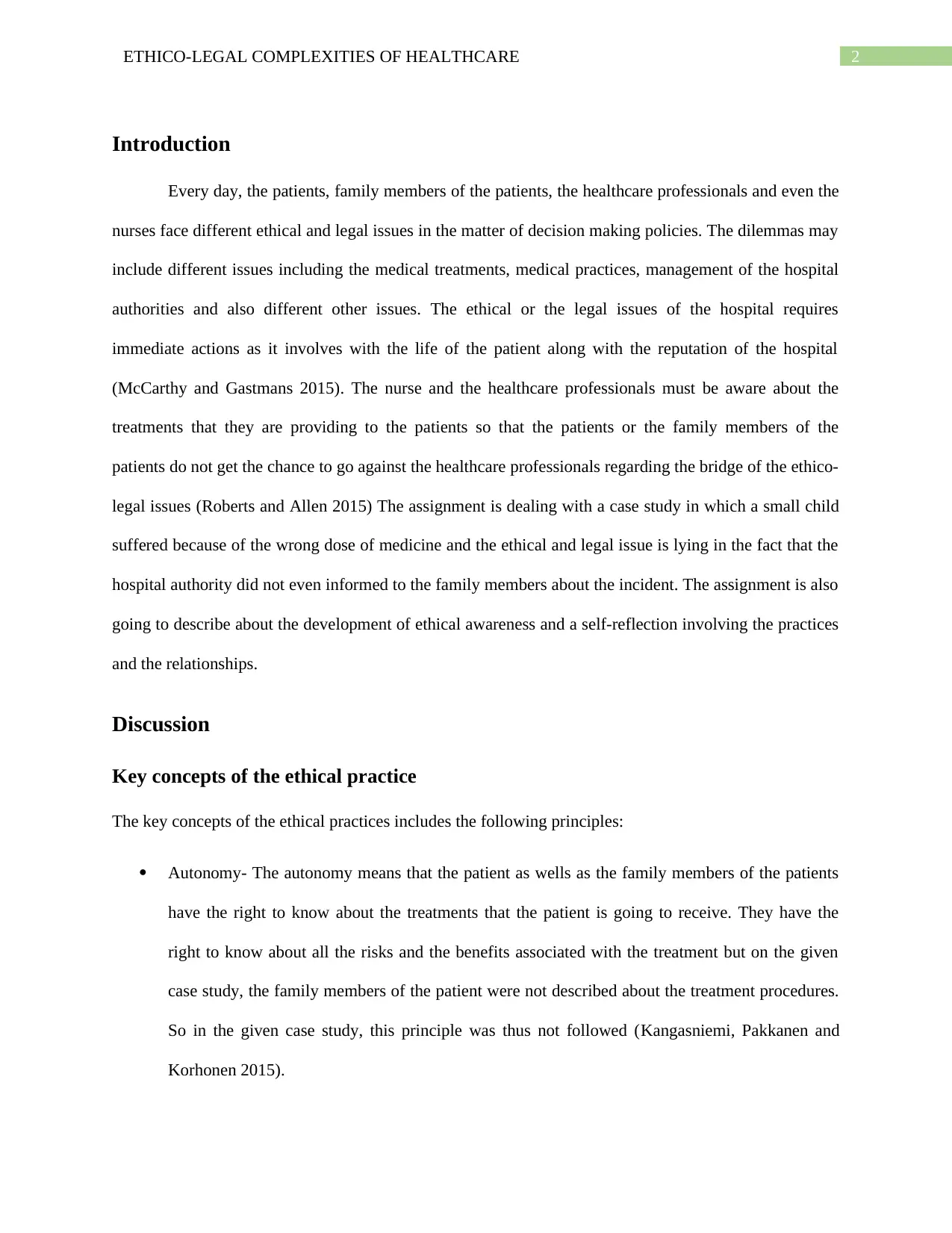
2ETHICO-LEGAL COMPLEXITIES OF HEALTHCARE
Introduction
Every day, the patients, family members of the patients, the healthcare professionals and even the
nurses face different ethical and legal issues in the matter of decision making policies. The dilemmas may
include different issues including the medical treatments, medical practices, management of the hospital
authorities and also different other issues. The ethical or the legal issues of the hospital requires
immediate actions as it involves with the life of the patient along with the reputation of the hospital
(McCarthy and Gastmans 2015). The nurse and the healthcare professionals must be aware about the
treatments that they are providing to the patients so that the patients or the family members of the
patients do not get the chance to go against the healthcare professionals regarding the bridge of the ethico-
legal issues (Roberts and Allen 2015) The assignment is dealing with a case study in which a small child
suffered because of the wrong dose of medicine and the ethical and legal issue is lying in the fact that the
hospital authority did not even informed to the family members about the incident. The assignment is also
going to describe about the development of ethical awareness and a self-reflection involving the practices
and the relationships.
Discussion
Key concepts of the ethical practice
The key concepts of the ethical practices includes the following principles:
Autonomy- The autonomy means that the patient as wells as the family members of the patients
have the right to know about the treatments that the patient is going to receive. They have the
right to know about all the risks and the benefits associated with the treatment but on the given
case study, the family members of the patient were not described about the treatment procedures.
So in the given case study, this principle was thus not followed (Kangasniemi, Pakkanen and
Korhonen 2015).
Introduction
Every day, the patients, family members of the patients, the healthcare professionals and even the
nurses face different ethical and legal issues in the matter of decision making policies. The dilemmas may
include different issues including the medical treatments, medical practices, management of the hospital
authorities and also different other issues. The ethical or the legal issues of the hospital requires
immediate actions as it involves with the life of the patient along with the reputation of the hospital
(McCarthy and Gastmans 2015). The nurse and the healthcare professionals must be aware about the
treatments that they are providing to the patients so that the patients or the family members of the
patients do not get the chance to go against the healthcare professionals regarding the bridge of the ethico-
legal issues (Roberts and Allen 2015) The assignment is dealing with a case study in which a small child
suffered because of the wrong dose of medicine and the ethical and legal issue is lying in the fact that the
hospital authority did not even informed to the family members about the incident. The assignment is also
going to describe about the development of ethical awareness and a self-reflection involving the practices
and the relationships.
Discussion
Key concepts of the ethical practice
The key concepts of the ethical practices includes the following principles:
Autonomy- The autonomy means that the patient as wells as the family members of the patients
have the right to know about the treatments that the patient is going to receive. They have the
right to know about all the risks and the benefits associated with the treatment but on the given
case study, the family members of the patient were not described about the treatment procedures.
So in the given case study, this principle was thus not followed (Kangasniemi, Pakkanen and
Korhonen 2015).
⊘ This is a preview!⊘
Do you want full access?
Subscribe today to unlock all pages.

Trusted by 1+ million students worldwide
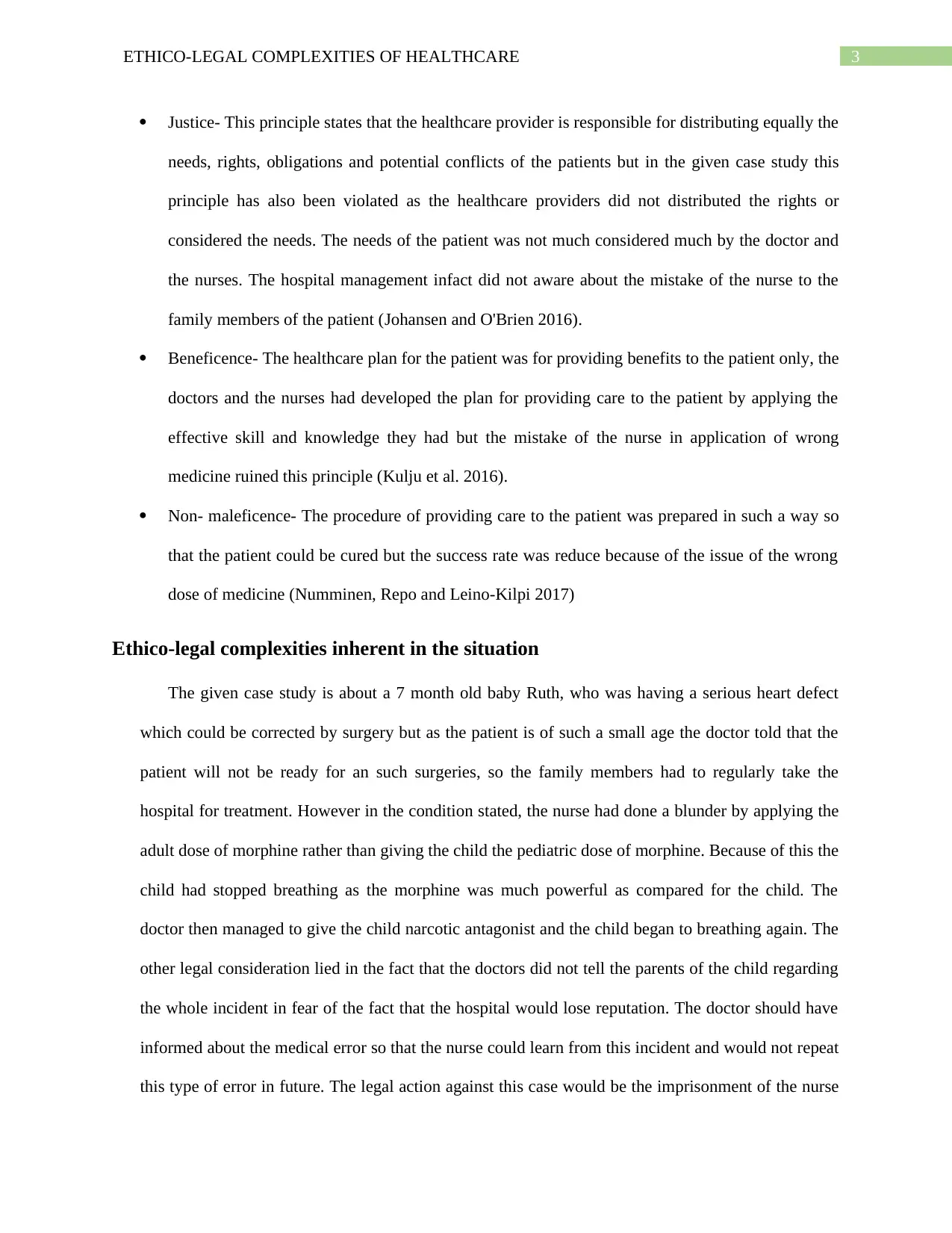
3ETHICO-LEGAL COMPLEXITIES OF HEALTHCARE
Justice- This principle states that the healthcare provider is responsible for distributing equally the
needs, rights, obligations and potential conflicts of the patients but in the given case study this
principle has also been violated as the healthcare providers did not distributed the rights or
considered the needs. The needs of the patient was not much considered much by the doctor and
the nurses. The hospital management infact did not aware about the mistake of the nurse to the
family members of the patient (Johansen and O'Brien 2016).
Beneficence- The healthcare plan for the patient was for providing benefits to the patient only, the
doctors and the nurses had developed the plan for providing care to the patient by applying the
effective skill and knowledge they had but the mistake of the nurse in application of wrong
medicine ruined this principle (Kulju et al. 2016).
Non- maleficence- The procedure of providing care to the patient was prepared in such a way so
that the patient could be cured but the success rate was reduce because of the issue of the wrong
dose of medicine (Numminen, Repo and Leino-Kilpi 2017)
Ethico-legal complexities inherent in the situation
The given case study is about a 7 month old baby Ruth, who was having a serious heart defect
which could be corrected by surgery but as the patient is of such a small age the doctor told that the
patient will not be ready for an such surgeries, so the family members had to regularly take the
hospital for treatment. However in the condition stated, the nurse had done a blunder by applying the
adult dose of morphine rather than giving the child the pediatric dose of morphine. Because of this the
child had stopped breathing as the morphine was much powerful as compared for the child. The
doctor then managed to give the child narcotic antagonist and the child began to breathing again. The
other legal consideration lied in the fact that the doctors did not tell the parents of the child regarding
the whole incident in fear of the fact that the hospital would lose reputation. The doctor should have
informed about the medical error so that the nurse could learn from this incident and would not repeat
this type of error in future. The legal action against this case would be the imprisonment of the nurse
Justice- This principle states that the healthcare provider is responsible for distributing equally the
needs, rights, obligations and potential conflicts of the patients but in the given case study this
principle has also been violated as the healthcare providers did not distributed the rights or
considered the needs. The needs of the patient was not much considered much by the doctor and
the nurses. The hospital management infact did not aware about the mistake of the nurse to the
family members of the patient (Johansen and O'Brien 2016).
Beneficence- The healthcare plan for the patient was for providing benefits to the patient only, the
doctors and the nurses had developed the plan for providing care to the patient by applying the
effective skill and knowledge they had but the mistake of the nurse in application of wrong
medicine ruined this principle (Kulju et al. 2016).
Non- maleficence- The procedure of providing care to the patient was prepared in such a way so
that the patient could be cured but the success rate was reduce because of the issue of the wrong
dose of medicine (Numminen, Repo and Leino-Kilpi 2017)
Ethico-legal complexities inherent in the situation
The given case study is about a 7 month old baby Ruth, who was having a serious heart defect
which could be corrected by surgery but as the patient is of such a small age the doctor told that the
patient will not be ready for an such surgeries, so the family members had to regularly take the
hospital for treatment. However in the condition stated, the nurse had done a blunder by applying the
adult dose of morphine rather than giving the child the pediatric dose of morphine. Because of this the
child had stopped breathing as the morphine was much powerful as compared for the child. The
doctor then managed to give the child narcotic antagonist and the child began to breathing again. The
other legal consideration lied in the fact that the doctors did not tell the parents of the child regarding
the whole incident in fear of the fact that the hospital would lose reputation. The doctor should have
informed about the medical error so that the nurse could learn from this incident and would not repeat
this type of error in future. The legal action against this case would be the imprisonment of the nurse
Paraphrase This Document
Need a fresh take? Get an instant paraphrase of this document with our AI Paraphraser
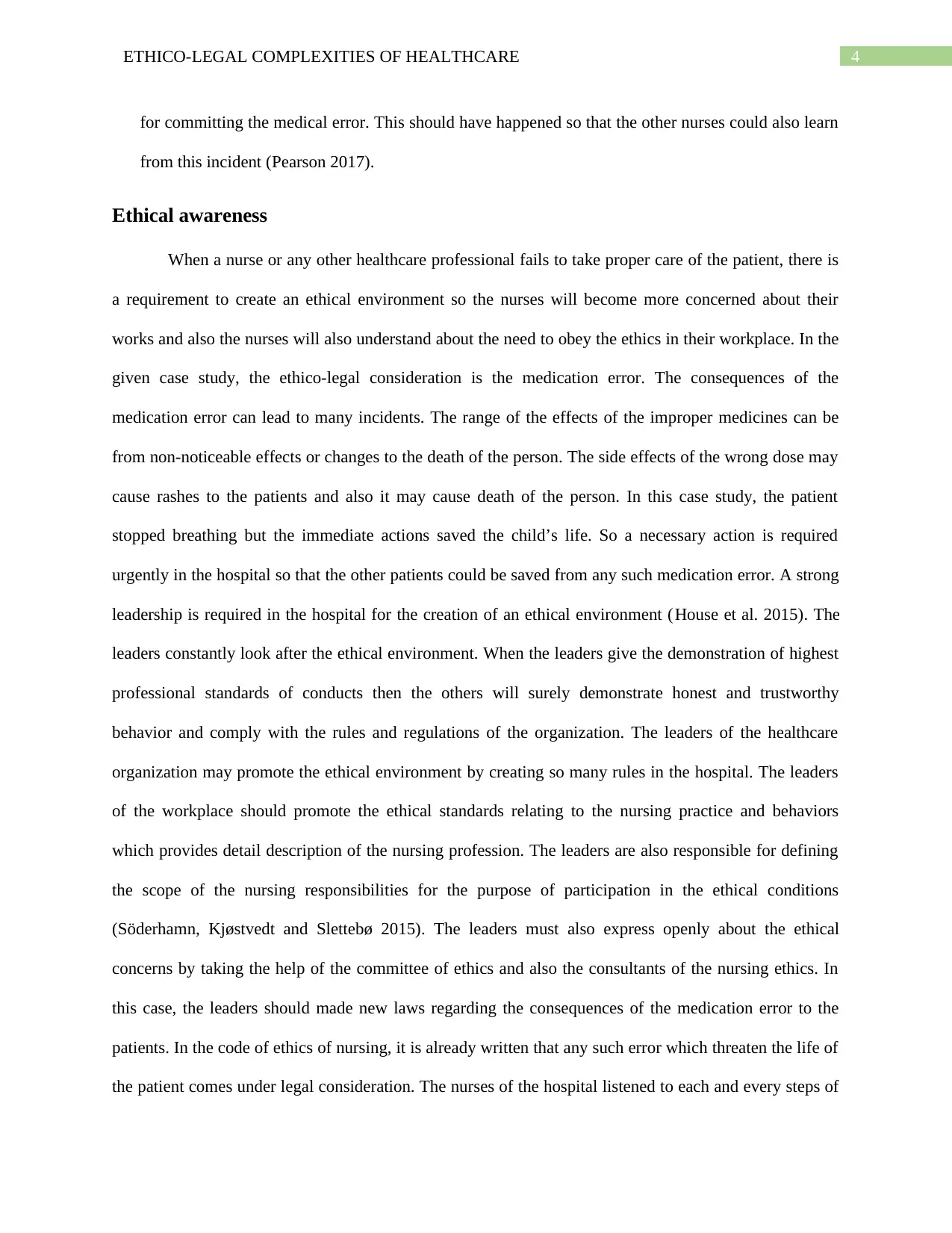
4ETHICO-LEGAL COMPLEXITIES OF HEALTHCARE
for committing the medical error. This should have happened so that the other nurses could also learn
from this incident (Pearson 2017).
Ethical awareness
When a nurse or any other healthcare professional fails to take proper care of the patient, there is
a requirement to create an ethical environment so the nurses will become more concerned about their
works and also the nurses will also understand about the need to obey the ethics in their workplace. In the
given case study, the ethico-legal consideration is the medication error. The consequences of the
medication error can lead to many incidents. The range of the effects of the improper medicines can be
from non-noticeable effects or changes to the death of the person. The side effects of the wrong dose may
cause rashes to the patients and also it may cause death of the person. In this case study, the patient
stopped breathing but the immediate actions saved the child’s life. So a necessary action is required
urgently in the hospital so that the other patients could be saved from any such medication error. A strong
leadership is required in the hospital for the creation of an ethical environment (House et al. 2015). The
leaders constantly look after the ethical environment. When the leaders give the demonstration of highest
professional standards of conducts then the others will surely demonstrate honest and trustworthy
behavior and comply with the rules and regulations of the organization. The leaders of the healthcare
organization may promote the ethical environment by creating so many rules in the hospital. The leaders
of the workplace should promote the ethical standards relating to the nursing practice and behaviors
which provides detail description of the nursing profession. The leaders are also responsible for defining
the scope of the nursing responsibilities for the purpose of participation in the ethical conditions
(Söderhamn, Kjøstvedt and Slettebø 2015). The leaders must also express openly about the ethical
concerns by taking the help of the committee of ethics and also the consultants of the nursing ethics. In
this case, the leaders should made new laws regarding the consequences of the medication error to the
patients. In the code of ethics of nursing, it is already written that any such error which threaten the life of
the patient comes under legal consideration. The nurses of the hospital listened to each and every steps of
for committing the medical error. This should have happened so that the other nurses could also learn
from this incident (Pearson 2017).
Ethical awareness
When a nurse or any other healthcare professional fails to take proper care of the patient, there is
a requirement to create an ethical environment so the nurses will become more concerned about their
works and also the nurses will also understand about the need to obey the ethics in their workplace. In the
given case study, the ethico-legal consideration is the medication error. The consequences of the
medication error can lead to many incidents. The range of the effects of the improper medicines can be
from non-noticeable effects or changes to the death of the person. The side effects of the wrong dose may
cause rashes to the patients and also it may cause death of the person. In this case study, the patient
stopped breathing but the immediate actions saved the child’s life. So a necessary action is required
urgently in the hospital so that the other patients could be saved from any such medication error. A strong
leadership is required in the hospital for the creation of an ethical environment (House et al. 2015). The
leaders constantly look after the ethical environment. When the leaders give the demonstration of highest
professional standards of conducts then the others will surely demonstrate honest and trustworthy
behavior and comply with the rules and regulations of the organization. The leaders of the healthcare
organization may promote the ethical environment by creating so many rules in the hospital. The leaders
of the workplace should promote the ethical standards relating to the nursing practice and behaviors
which provides detail description of the nursing profession. The leaders are also responsible for defining
the scope of the nursing responsibilities for the purpose of participation in the ethical conditions
(Söderhamn, Kjøstvedt and Slettebø 2015). The leaders must also express openly about the ethical
concerns by taking the help of the committee of ethics and also the consultants of the nursing ethics. In
this case, the leaders should made new laws regarding the consequences of the medication error to the
patients. In the code of ethics of nursing, it is already written that any such error which threaten the life of
the patient comes under legal consideration. The nurses of the hospital listened to each and every steps of
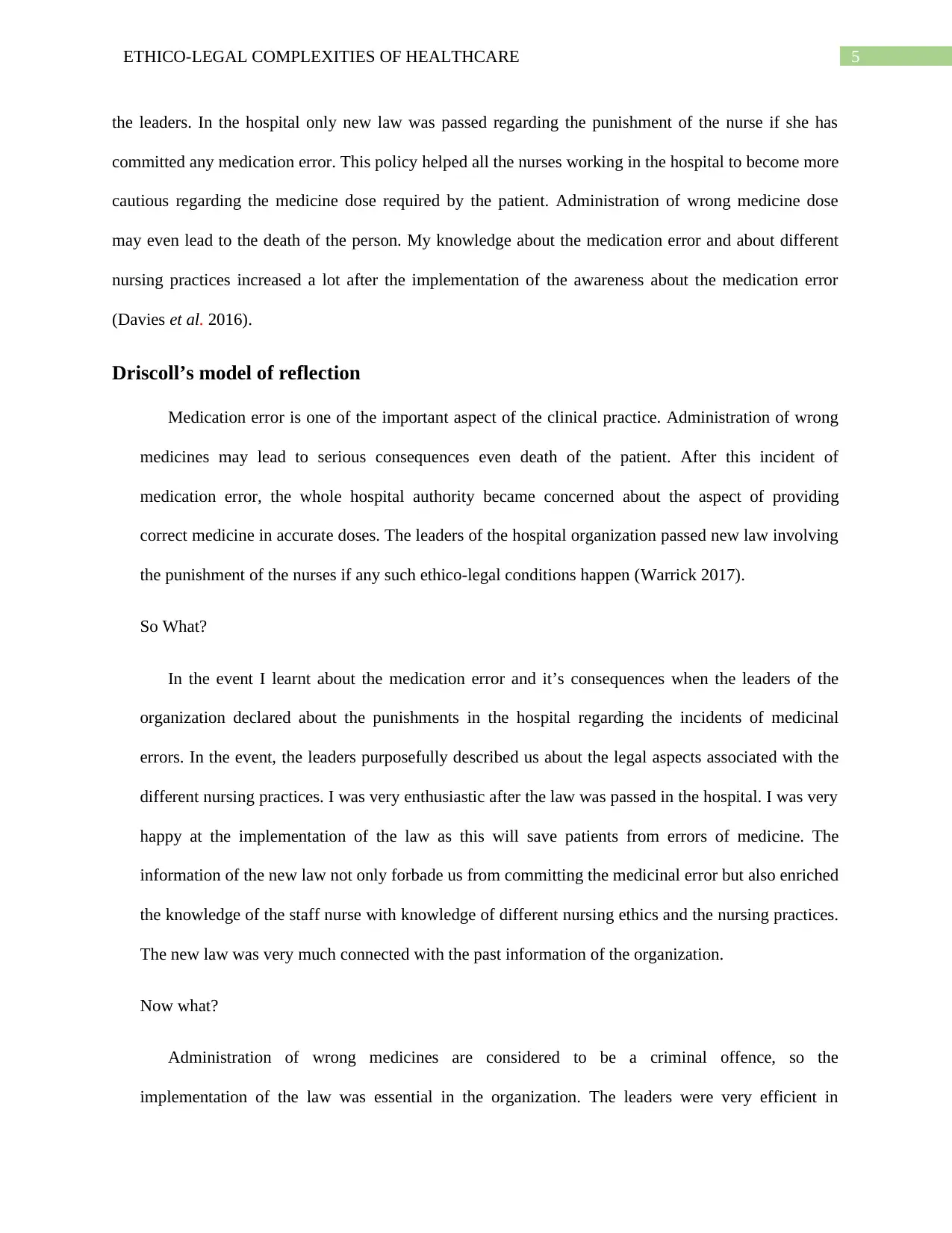
5ETHICO-LEGAL COMPLEXITIES OF HEALTHCARE
the leaders. In the hospital only new law was passed regarding the punishment of the nurse if she has
committed any medication error. This policy helped all the nurses working in the hospital to become more
cautious regarding the medicine dose required by the patient. Administration of wrong medicine dose
may even lead to the death of the person. My knowledge about the medication error and about different
nursing practices increased a lot after the implementation of the awareness about the medication error
(Davies et al. 2016).
Driscoll’s model of reflection
Medication error is one of the important aspect of the clinical practice. Administration of wrong
medicines may lead to serious consequences even death of the patient. After this incident of
medication error, the whole hospital authority became concerned about the aspect of providing
correct medicine in accurate doses. The leaders of the hospital organization passed new law involving
the punishment of the nurses if any such ethico-legal conditions happen (Warrick 2017).
So What?
In the event I learnt about the medication error and it’s consequences when the leaders of the
organization declared about the punishments in the hospital regarding the incidents of medicinal
errors. In the event, the leaders purposefully described us about the legal aspects associated with the
different nursing practices. I was very enthusiastic after the law was passed in the hospital. I was very
happy at the implementation of the law as this will save patients from errors of medicine. The
information of the new law not only forbade us from committing the medicinal error but also enriched
the knowledge of the staff nurse with knowledge of different nursing ethics and the nursing practices.
The new law was very much connected with the past information of the organization.
Now what?
Administration of wrong medicines are considered to be a criminal offence, so the
implementation of the law was essential in the organization. The leaders were very efficient in
the leaders. In the hospital only new law was passed regarding the punishment of the nurse if she has
committed any medication error. This policy helped all the nurses working in the hospital to become more
cautious regarding the medicine dose required by the patient. Administration of wrong medicine dose
may even lead to the death of the person. My knowledge about the medication error and about different
nursing practices increased a lot after the implementation of the awareness about the medication error
(Davies et al. 2016).
Driscoll’s model of reflection
Medication error is one of the important aspect of the clinical practice. Administration of wrong
medicines may lead to serious consequences even death of the patient. After this incident of
medication error, the whole hospital authority became concerned about the aspect of providing
correct medicine in accurate doses. The leaders of the hospital organization passed new law involving
the punishment of the nurses if any such ethico-legal conditions happen (Warrick 2017).
So What?
In the event I learnt about the medication error and it’s consequences when the leaders of the
organization declared about the punishments in the hospital regarding the incidents of medicinal
errors. In the event, the leaders purposefully described us about the legal aspects associated with the
different nursing practices. I was very enthusiastic after the law was passed in the hospital. I was very
happy at the implementation of the law as this will save patients from errors of medicine. The
information of the new law not only forbade us from committing the medicinal error but also enriched
the knowledge of the staff nurse with knowledge of different nursing ethics and the nursing practices.
The new law was very much connected with the past information of the organization.
Now what?
Administration of wrong medicines are considered to be a criminal offence, so the
implementation of the law was essential in the organization. The leaders were very efficient in
⊘ This is a preview!⊘
Do you want full access?
Subscribe today to unlock all pages.

Trusted by 1+ million students worldwide
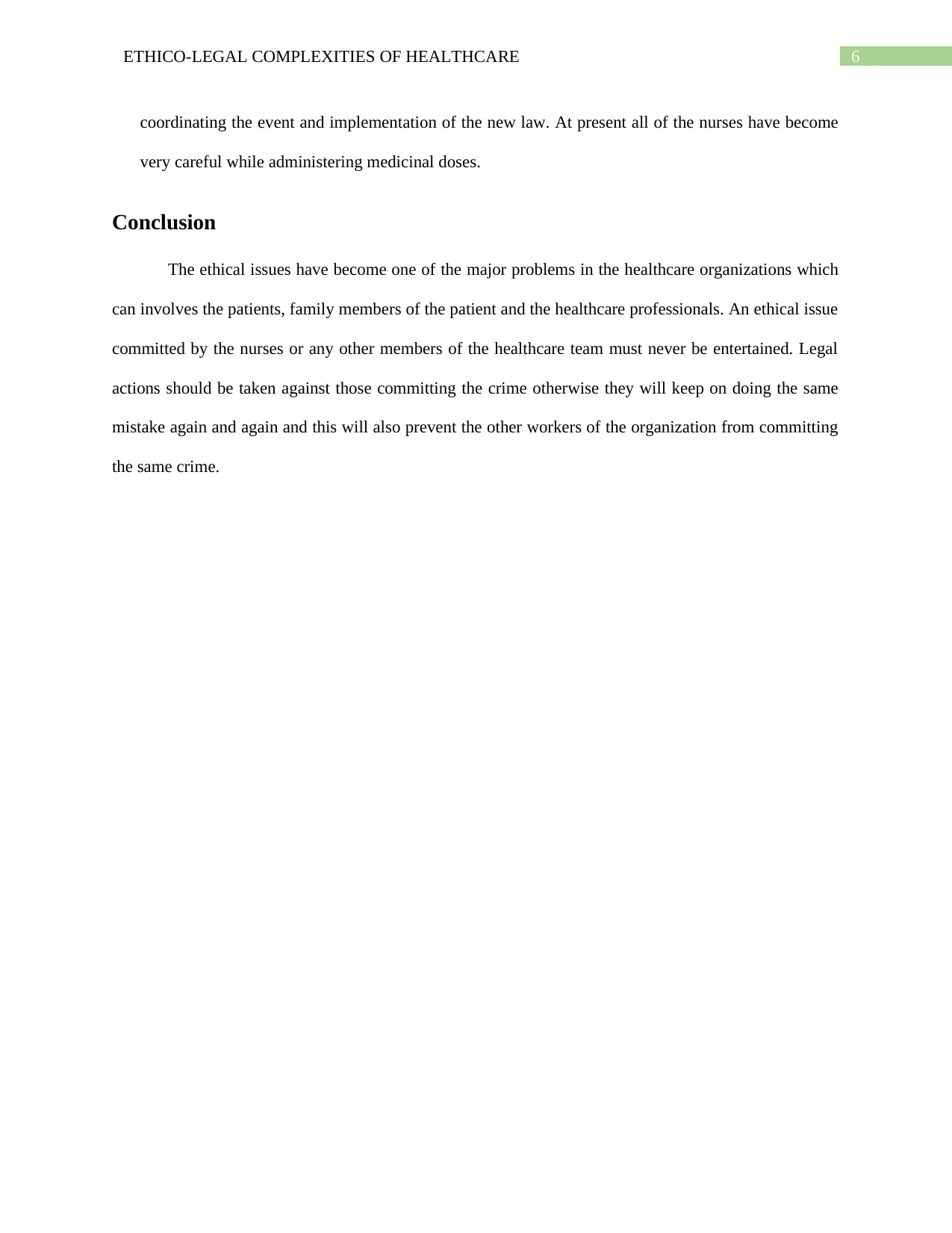
6ETHICO-LEGAL COMPLEXITIES OF HEALTHCARE
coordinating the event and implementation of the new law. At present all of the nurses have become
very careful while administering medicinal doses.
Conclusion
The ethical issues have become one of the major problems in the healthcare organizations which
can involves the patients, family members of the patient and the healthcare professionals. An ethical issue
committed by the nurses or any other members of the healthcare team must never be entertained. Legal
actions should be taken against those committing the crime otherwise they will keep on doing the same
mistake again and again and this will also prevent the other workers of the organization from committing
the same crime.
coordinating the event and implementation of the new law. At present all of the nurses have become
very careful while administering medicinal doses.
Conclusion
The ethical issues have become one of the major problems in the healthcare organizations which
can involves the patients, family members of the patient and the healthcare professionals. An ethical issue
committed by the nurses or any other members of the healthcare team must never be entertained. Legal
actions should be taken against those committing the crime otherwise they will keep on doing the same
mistake again and again and this will also prevent the other workers of the organization from committing
the same crime.
Paraphrase This Document
Need a fresh take? Get an instant paraphrase of this document with our AI Paraphraser
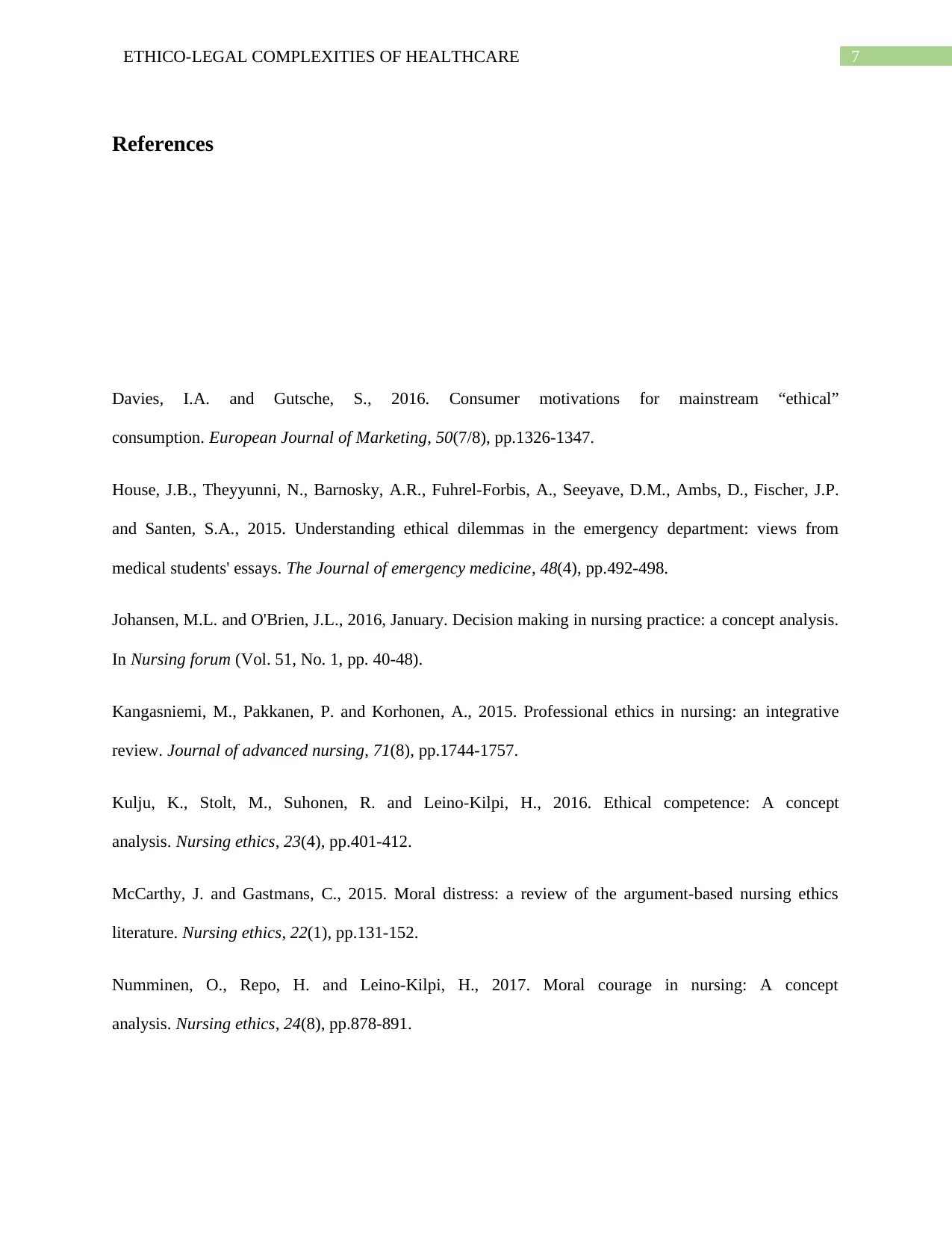
7ETHICO-LEGAL COMPLEXITIES OF HEALTHCARE
References
Davies, I.A. and Gutsche, S., 2016. Consumer motivations for mainstream “ethical”
consumption. European Journal of Marketing, 50(7/8), pp.1326-1347.
House, J.B., Theyyunni, N., Barnosky, A.R., Fuhrel-Forbis, A., Seeyave, D.M., Ambs, D., Fischer, J.P.
and Santen, S.A., 2015. Understanding ethical dilemmas in the emergency department: views from
medical students' essays. The Journal of emergency medicine, 48(4), pp.492-498.
Johansen, M.L. and O'Brien, J.L., 2016, January. Decision making in nursing practice: a concept analysis.
In Nursing forum (Vol. 51, No. 1, pp. 40-48).
Kangasniemi, M., Pakkanen, P. and Korhonen, A., 2015. Professional ethics in nursing: an integrative
review. Journal of advanced nursing, 71(8), pp.1744-1757.
Kulju, K., Stolt, M., Suhonen, R. and Leino-Kilpi, H., 2016. Ethical competence: A concept
analysis. Nursing ethics, 23(4), pp.401-412.
McCarthy, J. and Gastmans, C., 2015. Moral distress: a review of the argument-based nursing ethics
literature. Nursing ethics, 22(1), pp.131-152.
Numminen, O., Repo, H. and Leino-Kilpi, H., 2017. Moral courage in nursing: A concept
analysis. Nursing ethics, 24(8), pp.878-891.
References
Davies, I.A. and Gutsche, S., 2016. Consumer motivations for mainstream “ethical”
consumption. European Journal of Marketing, 50(7/8), pp.1326-1347.
House, J.B., Theyyunni, N., Barnosky, A.R., Fuhrel-Forbis, A., Seeyave, D.M., Ambs, D., Fischer, J.P.
and Santen, S.A., 2015. Understanding ethical dilemmas in the emergency department: views from
medical students' essays. The Journal of emergency medicine, 48(4), pp.492-498.
Johansen, M.L. and O'Brien, J.L., 2016, January. Decision making in nursing practice: a concept analysis.
In Nursing forum (Vol. 51, No. 1, pp. 40-48).
Kangasniemi, M., Pakkanen, P. and Korhonen, A., 2015. Professional ethics in nursing: an integrative
review. Journal of advanced nursing, 71(8), pp.1744-1757.
Kulju, K., Stolt, M., Suhonen, R. and Leino-Kilpi, H., 2016. Ethical competence: A concept
analysis. Nursing ethics, 23(4), pp.401-412.
McCarthy, J. and Gastmans, C., 2015. Moral distress: a review of the argument-based nursing ethics
literature. Nursing ethics, 22(1), pp.131-152.
Numminen, O., Repo, H. and Leino-Kilpi, H., 2017. Moral courage in nursing: A concept
analysis. Nursing ethics, 24(8), pp.878-891.
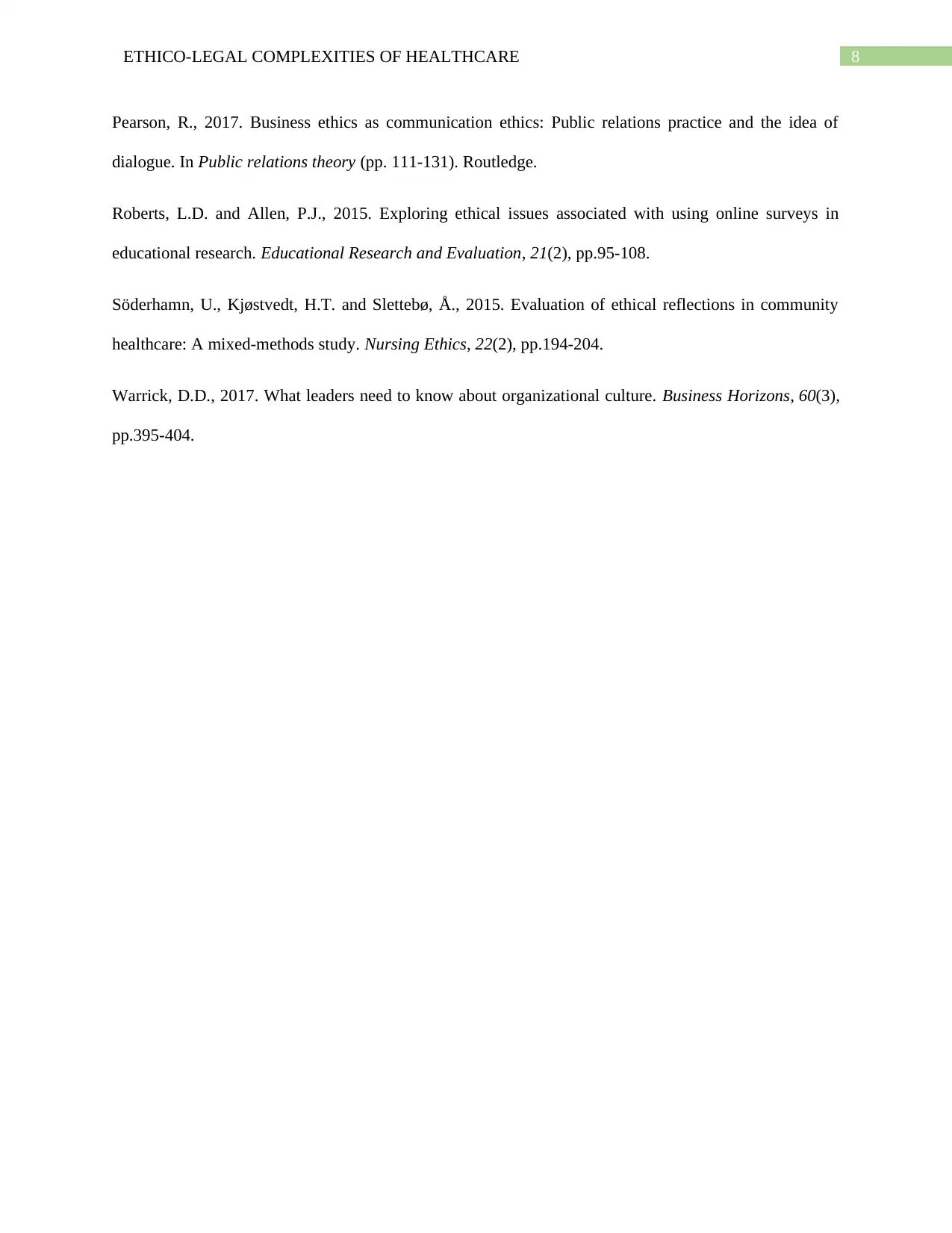
8ETHICO-LEGAL COMPLEXITIES OF HEALTHCARE
Pearson, R., 2017. Business ethics as communication ethics: Public relations practice and the idea of
dialogue. In Public relations theory (pp. 111-131). Routledge.
Roberts, L.D. and Allen, P.J., 2015. Exploring ethical issues associated with using online surveys in
educational research. Educational Research and Evaluation, 21(2), pp.95-108.
Söderhamn, U., Kjøstvedt, H.T. and Slettebø, Å., 2015. Evaluation of ethical reflections in community
healthcare: A mixed-methods study. Nursing Ethics, 22(2), pp.194-204.
Warrick, D.D., 2017. What leaders need to know about organizational culture. Business Horizons, 60(3),
pp.395-404.
Pearson, R., 2017. Business ethics as communication ethics: Public relations practice and the idea of
dialogue. In Public relations theory (pp. 111-131). Routledge.
Roberts, L.D. and Allen, P.J., 2015. Exploring ethical issues associated with using online surveys in
educational research. Educational Research and Evaluation, 21(2), pp.95-108.
Söderhamn, U., Kjøstvedt, H.T. and Slettebø, Å., 2015. Evaluation of ethical reflections in community
healthcare: A mixed-methods study. Nursing Ethics, 22(2), pp.194-204.
Warrick, D.D., 2017. What leaders need to know about organizational culture. Business Horizons, 60(3),
pp.395-404.
⊘ This is a preview!⊘
Do you want full access?
Subscribe today to unlock all pages.

Trusted by 1+ million students worldwide
1 out of 9
Related Documents
Your All-in-One AI-Powered Toolkit for Academic Success.
+13062052269
info@desklib.com
Available 24*7 on WhatsApp / Email
![[object Object]](/_next/static/media/star-bottom.7253800d.svg)
Unlock your academic potential
Copyright © 2020–2026 A2Z Services. All Rights Reserved. Developed and managed by ZUCOL.





